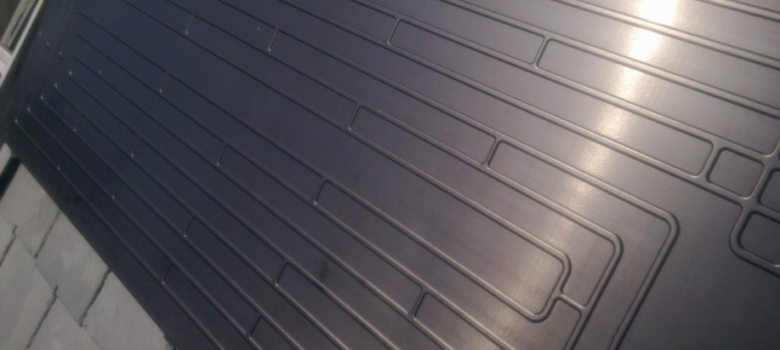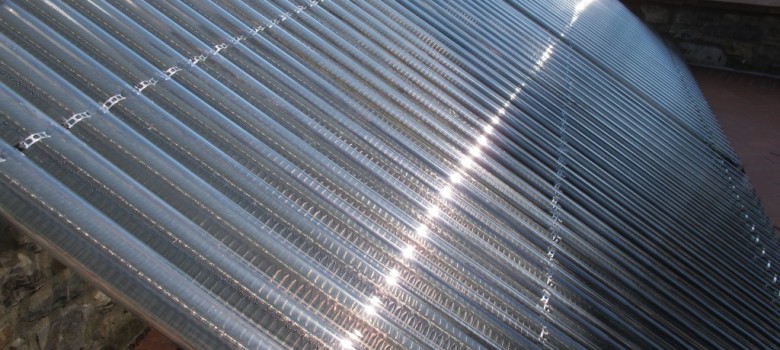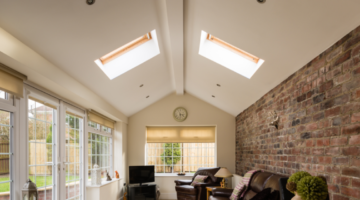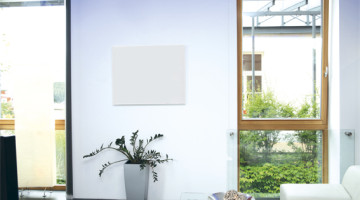
Thermodynamic panels are a form of renewable heating. They basically work similarly to air source heat pumps, but are less bulky and don’t require fans.
The panels work by circulating liquid coolant which absorbs heat from the atmosphere and turns it into gas. The gas then goes through a compressor, which boosts its temperature so that it is hot enough to heat water. In theory they take the best elements of solar thermal and heat pumps and pull them together into one technology.
If you know how your fridge works, imagine that in reverse and you’ll get the general idea…
The theory behind thermodynamic panels
The technology hinges on the difference in temperature between the coolant and the air around it. Because the refrigerant going round the panel is at a very low temperature of between -20°C and -30°C, it can absorb relative warmth from the air even on cold days.
The water reaches a max. temperature of 55ºC, meaning it can be used for showering, swimming pools or to supplement central heating. Systems include a built-in immersion heater that occasionally spikes the water temperature to 70ºC to kill off bacteria such as Legionella.
Unlike solar PV or solar thermal systems, these panels are apparently unaffected by weather. Proponents claim they heat just as effectively in windy, wet or freezing weather as they do on hot or sunny days. Thermodynamic panels are normally installed on a roof or a wall, so they can be fairly discreet, unlike bulky heat pumps. Solar gain will help their efficiency, but the panels are designed to work without it, so the direction the panels are facing is not an essential consideration.
The reality of thermodynamic panels
Thermodynamic panels sound like a pretty exciting development – but do they live up to hype? Claims of free, clean, unlimited energy currently seem unsubstantiated.
Most manufacturers suggest that one or two panels will be sufficient to heat sanitary water for a family of four. Each panel costs £5000 to buy and install, so not cheap. It’s also hard to accept that the hot water they produce is ‘free’ when you consider that the compressor runs on electricity. Electricity costs for a domestic system are estimated at around £8 to £10 per month.
Thermodynamic panels have been around for a few years now, and it’s tempting to suggest that if they were all they were cracked up to be, they would have been more widely adopted by now. One issue is that they are pretty complicated, and complicated equipment tends to go wrong more often, and be more difficult to fix. When it comes to home heating, reliability is very important, and unreliable systems are going to fall to the bottom of the pile when it comes to a customer choosing to buy a new system.
The basic idea behind the technology makes sense, but studies have been somewhat underwhelming when it comes to results.
What is the future for thermodynamic panels?
There were hopes that they would qualify for the Renewable Heat Incentive, which pays homeowners for installing renewable heat technologies. Although RHI rates are not as high as they were, the scheme is still an incentive and a reassurance for those installing systems included in it.
Thermodynamic panels have not been made eligible in the latest wave of changes to the scheme. The fact the Government does not recognise the technology doesn’t reflect well, as it suggests a lack of belief in the benefit of thermodynamic panels for homeowners.
The bottom line is that there is currently no clear guarantee of their performance, so we would maybe suggest waiting for this before adopting the technology. The systems need to make financial sense without Government funding, because – as adopters of solar PV have found out – this cannot be relied on.
Who knows what the future will hold for thermodynamic panels? Maybe with some refinement they could become a viable heating option. Have you had one installed? If so, comment below and let us know your thoughts!














thank you. I had considered these as a supplement or alternative to an air-source heat pump system to help the underfloor heating system for our village hall and put the panels on the flat roof. It sounds as though we should wait and save our pennies for either an air or ground-source system.eventually. first I have to figure out how to safely insulate a suspended false ceiling 6m up.
I have had an Energie system installed now for over 2 years, the system works very well however the supplier has ceased trading and they didnt offer any service or support. the system need the anode replacing every 12 months to 2 years which is an ongoing cost and backup only comes from similar copanies who only want to install new systems. i have a thermostat problem where my system overheats running the compressor constantly. To repair this it requires a complete new control system? The Portugese manafacturer does not seem to have an established service network in the UK with parts available for simple repairs. I have to turn the system off manually to avoid the too hot alarm otherwise it works OK.
I have mine on a timer socket
Hello Andy, that’s interesting to hear about the “anode needs replacing”, as it was supposed to be “maintenance free”?
Having something replaced “every 12months to 2 years” does not sound “maintenance free” to me.
i feel i was conned having this system fitted. i was told at the time that the rhi would be granted shortly and the system would pay for itself. 6 years on and it hasnt
MY THERMODYNAMIC PANEL WORKS IN ALL WEATHERS IMPORTANTLY AND FOR THE MONEY INVESTED I BELIEVE IT DELIVERS A RELIABLE SOURCE OF HEATED WATER FOR OUR FAMILY – THOUGH I WOULDN’T SAY ‘FREE’ IS THE WORD I WOULD USE. ITS SUBSTANTIALLY CHEAPER THAN THE GAS HEATING SYSTEM I HAD (THAT I STILL KEEP IN ORDER TO SPIKE THE WATER FROM 55 TO 63 TO AVOID LEGIONELLA AS MY LITTLE MAGIC BOX ONLY HEATS UP TO 55) BUT I AM AWARE THAT £8-10 PER MONTH OF ELECTRICITY IS SPENT ON HOT WATER. RECENT SCARES THAT GAS WILL BE DEPLETED OR THAT PURCHASING OF GAS (FROM RUSSIA?) MAY BECOME AN ISSUE MAKES ME FEEL SECURE THAT I KNOW WE WILL ALWAYS HAVE HOT WATER. ITS A SCIENCE THAT NO-ONE WANTS TO SPEND MORE TIME EVOLVING WHICH IS A SHAME. MY ORIGINAL INSTALLERS HAVE GONE BUST SO TRYING TO GET SOMETHING SERVICED OR LOOKED AT IS A NIGHTMARE HAVING TO GO THROUGH MY CONSUMER INSURANCE EACH TIME (WHICH TAKES AGES). THE LITTLE MAGIC BOX COMPANY HAVE BEEN VERY HELPFUL. I STILL MAINTAIN INTEGRATING OUR PRE-EXISTING GAS HEATING SYSTEM WITH THE THERMAL DYNAMIC SYSTEM IS THE ACTUAL PROBLEM THAT NEEDS TO BE PROPERLY SOLVED FOR THE BENEFIT ALL FUTURE INSTALLATIONS .
Similar story to others, our system was installed 3/4 years ago amid promises that it would garner a grant from the government, which it didn’t. The system they fitted was not suitable for our needs and we had to go to solicitors to get it removed and a new one fitted. The company went bankrupt about a year later and now the system has broken down altogether. All that said we are considering having it replaced with a new, improved one at about half the original price. Does it make financial sense? Absolutely not. Does it make environmental sense? I think probably yes..
Our system installed in 2014 by a firm who didn’t know what they were doing and who have ceased trading. Initially we had huge problems with a system that worked then didn’t and it always stopped working when needed the most. We eventually found someone who knew what to do and since then the system has worked well. However he has to travel some way if we need him. The initial installers damaged our roof and covered this up with a poor repair that has now failed and to repair
this the panels have to be removed and reinstalled. The cost we think is the same as a gas system would be but we chose this because of the future of gas. It works beautifully even in the deepest snow.
Dear Jean
Where did you find the person to fix your Magic box please? Our installer too has gone out of business. MCS provided some phone numbers locally but they will only fix what they have installed themselves.
I have a little magic box that was fitted two years ago. It is added onto my existing system so I have gas for backup if I ever needed it. It has not missed a beat ‘touch wood’ so far. Temperate always sits at 55 and now and then it goes incredibly hot to kill legionella. Running costs are not huge and I am not using gas and reducing my carbon footprint.
I have solar edge solar panels installed and solax battery storage. This is a huge benefit for the magic box because as it works most in the evening after the kids have a bath (when the sun is going down) I have stored electric from the sun to power it through the evening. Meaning I pretty much have free hot water ‘apart from when we get poor weather in winter’.
I had the option of this or an air pump which would have been a big unit on the side of the house taking up garden ground space. But it does come with a Feed payment as the magic box doesn’t. That’s quite disappointing because I think the magic box would be a great way for new house to be built with no need for a gas supply. I hope to see more of it in the future it’s clever technology and very green.
I am aware that older systems had a lot of issues.
does the thermodynamic panel’s heat transferring liquid same as used in solar thermal panels system?
for easy maintenance purpose and reducing installation cost, Solar PVT or solar thermal tube collectors installed on front wall rather than roof for easy assess in England?